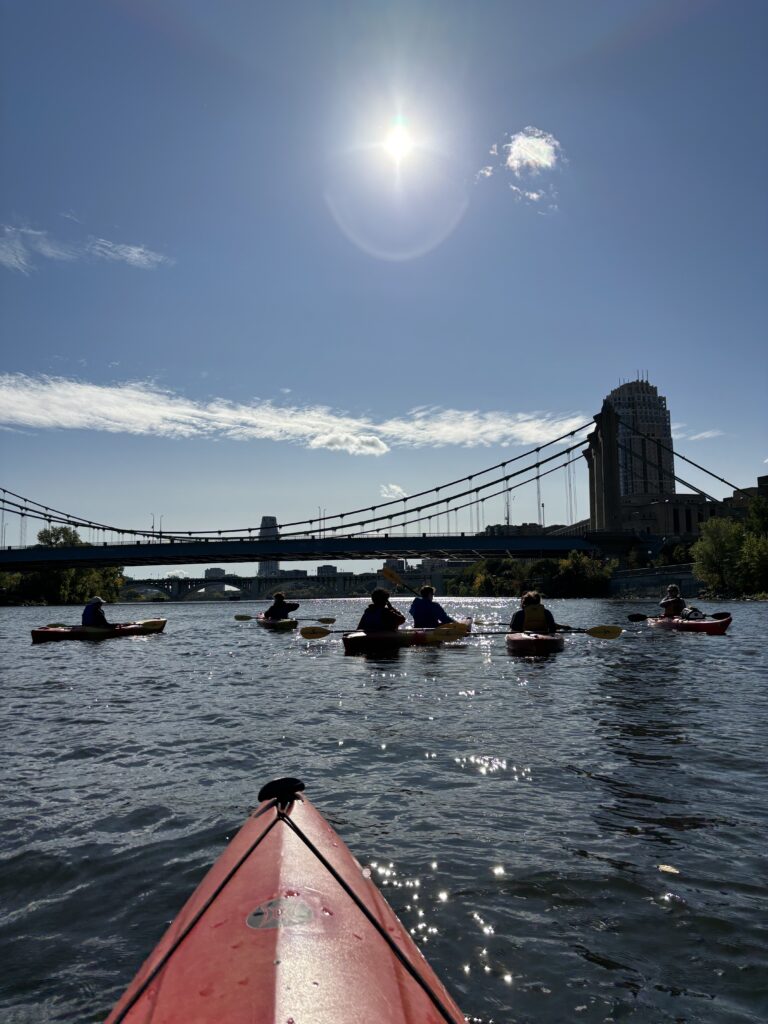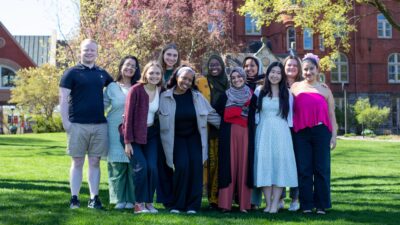
Located between two bustling cities, Macalester allows professors to extend their classes beyond campus, such as kayaking the Mississippi to study water resources or touring a local brewery to see microbiology in action. We spoke to four professors who incorporated off-campus learning into their fall classes.
We’re not just in an urban location—we’re in a state capitol.
—Professor Lesley Lavery
Economics of the Twin Cities
Professor Sarah West
How have you engaged with the Twin Cities?
After reading about and discussing neighborhoods, economic history, and local policy, we went to the places that we studied. We visited Bdote, the area at the confluence of the Mississippi and Minnesota rivers, a place of gathering for the Dakota, and center for the fur trade in the early to mid-1800s. We took public transit to visit south Minneapolis, where we experienced how the built environment affects light rail riders, and to the Rondo neighborhood to see with our own eyes how I-94 disrupted an area once thriving—and perhaps someday thriving again—with Black-owned businesses. Then, we learned about entrepreneurship among the Latinx community along Lake Street during a visit to Midtown. After each visit we reflected about how our experiences in the field relate to academic research on the areas.
What do you hope students will take away from the course?
I hope they’ll understand how economic history and policy shapes the Twin Cities—the place where we live. While the Twin Cities continues to have one of the most robust metro economies in the nation, the benefits of economic activity are spread very unevenly across Twin Cities households. I hope that academic research comes alive for students as they see statistical relationships from articles demonstrated in areas that we visit. I hope they are inspired to experience cities in a new way—with a critical eye, and grounded in historical and empirical understanding. And I hope they feel empowered to truly live and participate in, not just visit, the place they call home for four years.
Political Science department
Professor and chair of political science, Lesley Lavery
How has the political science department engaged with the Twin Cities?
My U.S. City and Metro Politics class worked with the Macalester-Groveland community council to build an equity development scorecard for members to use when evaluating development projects and renovations.
Our undergraduate honors club, Pi Sigma Alpha, organized a field trip by city bus to the city council for a recent budget meeting. They brought a group of students on a tour with a council member’s chief of staff, observed the meeting, then came back to debrief with the political science faculty.
My Education Politics and Policy students took a field trip to a school board meeting and a nearby charter school to observe politics in action. We also welcomed guest speakers from the state legislature, local public schools, and teachers unions.
Professor Julie Dolan leads our Legislative Politics course that facilitates internships at the state capitol every spring.
How do you think Macalester’s urban location enriches learning, especially for political science students?
We’re not just in an urban location—we’re in a state capitol. For folks interested in U.S. politics, that means a lot of opportunities to engage with the legislative, judicial, and executive branch as well as the 4th branch: state bureaucracy. We incorporate all of these institutions in our courses and students intern in all of these spaces. There are a plethora of local governments and the Metropolitan Council is a unique form of regional governance. All of these provide valuable perspectives and experience.
Microbiology
Professor Robin Shields-Cutler
A lot of people think only of … disease when they think “microbiology…,” but only a tiny fraction of microbes cause any disease to humans, and the rest make up the most diverse network of organisms on the planet, crucial for sustaining life.
—Professor Shields-Cutler
How has your course engaged with the Twin Cities?
We take a field trip to see microbiology “in action” in a context where it is often overlooked, such as a sewage treatment plant (entirely dependent on microbes!) and to a couple different brewing facilities. This semester we toured Surly, a craft brewery founded by a Macalester alum that conducts in-house laboratory work. Students learned about the brewing processes, the important role of microbes, and the microbiological testing and control needed to make a consistent and safe product. Surly’s lab uses many of the same techniques taught in our class—a great demonstration to the students that they are learning real-world skills. We talk about career paths and how many microbiology jobs exist that have nothing to do with academia or medicine.
What’s something that may surprise people about microbiology?
A lot of people think only of pathogens, germs, and disease when they think “microbiology,” and that we should sanitize everything to avoid germs. But only a tiny fraction of microbes cause any disease to humans, and the rest make up the most diverse network of organisms on the planet, crucial for sustaining life. Our own bodies would not develop and function properly without trillions of bacteria living inside and on us.
In class, we discuss the ways we benefit from microbes, whether that’s through our gut microbiome or by creating delicious food for us to eat through fermentation.

Water and Power
Professor Roopali Phadke
I want Macalester students to move beyond the bubble and see how we are a community nested in a much larger community—and what we do here matters to that larger community.
—Professor Roopali Phadke
How has your class interacted with the Twin Cities?
We visited a water treatment plant to help students learn where water comes from in the Cities. How does it get to their tap? Where does it go when they flush the toilet?
As part of our Mississippi unit, we took a guided tour of the river, kayaking the urbanized stretch above St. Anthony Falls. For many students, this was their first time ever in a kayak. It was both an opportunity for community building, as well as asking questions, such as “How do you restore an urban river?”and “Who is this river for?”
We discussed our experiences with clean water during a workshop led by Stephanie Lindquist, an artist who works with soil and water. In the Idea Lab, we built and tested water filters using samples from local streams, lakes, and springs.
What is the course’s goal?
I want Macalester students to move beyond the bubble and see how we are a community nested in a much larger community—and what we do here matters to that larger community. Water is a perfect vehicle for making that apparent to them: whether it’s water conservation, infrastructure, or what happens when we flush the toilet that connects us to the wider Twin Cities. We have a responsibility beyond the bubble, and we also have a rich set of opportunities that comes with being in a city with the nation’s most revered river flowing through our backyard.
January 9 2024
Back to top




